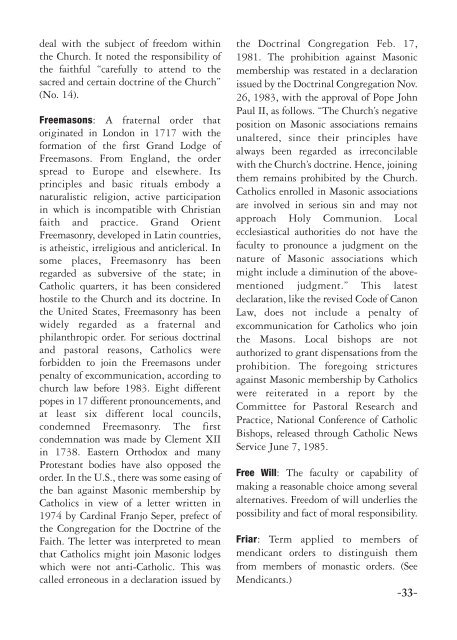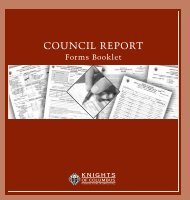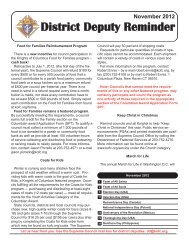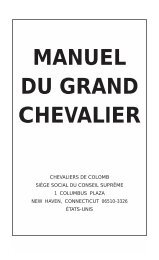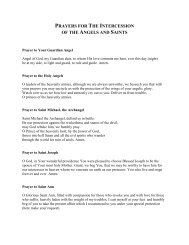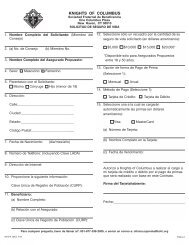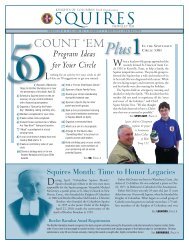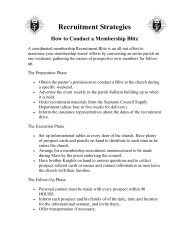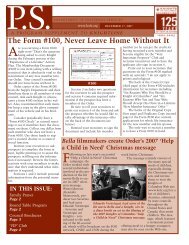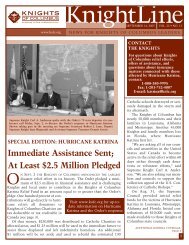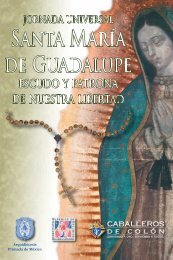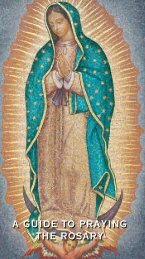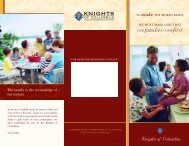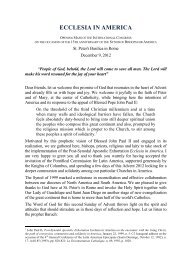CATHOLIC WORD BOOK - Knights of Columbus, Supreme Council
CATHOLIC WORD BOOK - Knights of Columbus, Supreme Council
CATHOLIC WORD BOOK - Knights of Columbus, Supreme Council
Create successful ePaper yourself
Turn your PDF publications into a flip-book with our unique Google optimized e-Paper software.
deal with the subject <strong>of</strong> freedom within<br />
the Church. It noted the responsibility <strong>of</strong><br />
the faithful “carefully to attend to the<br />
sacred and certain doctrine <strong>of</strong> the Church”<br />
(No. 14).<br />
Freemasons: A fraternal order that<br />
originated in London in 1717 with the<br />
formation <strong>of</strong> the first Grand Lodge <strong>of</strong><br />
Freemasons. From England, the order<br />
spread to Europe and elsewhere. Its<br />
principles and basic rituals embody a<br />
naturalistic religion, active participation<br />
in which is incompatible with Christian<br />
faith and practice. Grand Orient<br />
Freemasonry, developed in Latin countries,<br />
is atheistic, irreligious and anticlerical. In<br />
some places, Freemasonry has been<br />
regarded as subversive <strong>of</strong> the state; in<br />
Catholic quarters, it has been considered<br />
hostile to the Church and its doctrine. In<br />
the United States, Freemasonry has been<br />
widely regarded as a fraternal and<br />
philanthropic order. For serious doctrinal<br />
and pastoral reasons, Catholics were<br />
forbidden to join the Freemasons under<br />
penalty <strong>of</strong> excommunication, according to<br />
church law before 1983. Eight different<br />
popes in 17 different pronouncements, and<br />
at least six different local councils,<br />
condemned Freemasonry. The first<br />
condemnation was made by Clement XII<br />
in 1738. Eastern Orthodox and many<br />
Protestant bodies have also opposed the<br />
order. In the U.S., there was some easing <strong>of</strong><br />
the ban against Masonic membership by<br />
Catholics in view <strong>of</strong> a letter written in<br />
1974 by Cardinal Franjo Seper, prefect <strong>of</strong><br />
the Congregation for the Doctrine <strong>of</strong> the<br />
Faith. The letter was interpreted to mean<br />
that Catholics might join Masonic lodges<br />
which were not anti-Catholic. This was<br />
called erroneous in a declaration issued by<br />
the Doctrinal Congregation Feb. 17,<br />
1981. The prohibition against Masonic<br />
membership was restated in a declaration<br />
issued by the Doctrinal Congregation Nov.<br />
26, 1983, with the approval <strong>of</strong> Pope John<br />
Paul II, as follows. “The Church’s negative<br />
position on Masonic associations remains<br />
unaltered, since their principles have<br />
always been regarded as irreconcilable<br />
with the Church’s doctrine. Hence, joining<br />
them remains prohibited by the Church.<br />
Catholics enrolled in Masonic associations<br />
are involved in serious sin and may not<br />
approach Holy Communion. Local<br />
ecclesiastical authorities do not have the<br />
faculty to pronounce a judgment on the<br />
nature <strong>of</strong> Masonic associations which<br />
might include a diminution <strong>of</strong> the abovementioned<br />
judgment.” This latest<br />
declaration, like the revised Code <strong>of</strong> Canon<br />
Law, does not include a penalty <strong>of</strong><br />
excommunication for Catholics who join<br />
the Masons. Local bishops are not<br />
authorized to grant dispensations from the<br />
prohibition. The foregoing strictures<br />
against Masonic membership by Catholics<br />
were reiterated in a report by the<br />
Committee for Pastoral Research and<br />
Practice, National Conference <strong>of</strong> Catholic<br />
Bishops, released through Catholic News<br />
Service June 7, 1985.<br />
Free Will: The faculty or capability <strong>of</strong><br />
making a reasonable choice among several<br />
alternatives. Freedom <strong>of</strong> will underlies the<br />
possibility and fact <strong>of</strong> moral responsibility.<br />
Friar: Term applied to members <strong>of</strong><br />
mendicant orders to distinguish them<br />
from members <strong>of</strong> monastic orders. (See<br />
Mendicants.)<br />
-33-


